It can be frustrating when your Jeep doesn’t start, especially when the battery seems fine. Understanding the common reasons behind starting issues can help you troubleshoot earlier.
Check the starter, fuel pump, or fuel filter if your Jeep won’t start, but the battery is good. Clean and tighten battery connections. A faulty starter or fuel issue could be the cause.
This guide covers the main causes of starting problems and helpful troubleshooting tips to keep your Jeep running smoothly.
Importance of understanding vehicle starting issues
Recognizing why your Jeep won’t start can save you from costly repairs. It helps to diagnose problems early, fix them quicker, and prevent breakdowns. Knowing vehicle starting issues can ensure your Jeep stays reliable and ready to go.
Common misconceptions about battery-related problems
Many assume a bad battery is always the reason for starting issues, but that’s not always true. Sometimes, the problem may be a loose connection or a faulty starter. It’s important to check all parts involved in starting the vehicle.
Why Your Jeep Won’t Start Despite a Good Battery
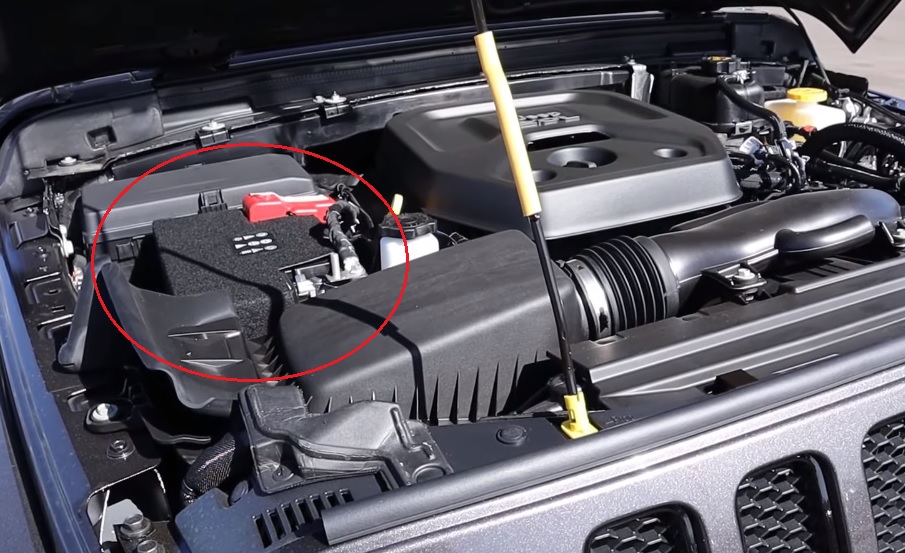
1. The Role of the Battery in Starting
The battery provides electrical power to start the engine. Turning the key sends electricity to the starter motor, which then turns the engine over. The Jeep won’t start without a functioning battery, no matter how good other parts are.
2. Misinterpreted Symptoms of a Bad Battery
If your Jeep struggles to start or shows signs of dim lights, many think it’s the battery. However, it could also be caused by a bad alternator, worn-out cables, or a faulty starter. Diagnosing the exact issue helps avoid mistaken repairs.
Must Read: Jeep Wrangler Pulls To The Right When Braking – Guidance!
Key Reasons Why Your Jeep Won’t Start
1. Starter
To test the starter, listen for a clicking sound when you turn the key. You can also check the voltage at the starter using a multimeter. The starter may need replacing if it’s low or there’s no power.
2. Faulty Starter Motor
A faulty starter motor can prevent your Jeep from starting. It’s responsible for turning the engine over when you start your Jeep. If the starter motor is damaged or worn out, it won’t turn the engine, making it impossible to start.
Signs of a Failing Starter
- There is a clicking noise when turning the key, but the engine doesn’t turn over.
- Grinding sound when starting the engine.
- The engine cranks slowly or struggles to turn over.
- The jeep doesn’t start despite a charged battery.
- The starter works intermittently, sometimes starting and other times not.
- Dashboard lights flicker when attempting to start the vehicle.
- A smell of burning or unusual odors when trying to start the engine.
Ignition Switch Issues
- The key won’t turn in the ignition or feels stuck.
- The engine fails to crank or turn over when turning the key.
- The Jeep starts intermittently, sometimes starting and sometimes not.
- Dashboard lights don’t come on when the key is in the “on” position.
- The engine shuts off unexpectedly while driving, indicating a faulty switch.
- The ignition switch feels loose or wobbly when turning.
Bad Alternator
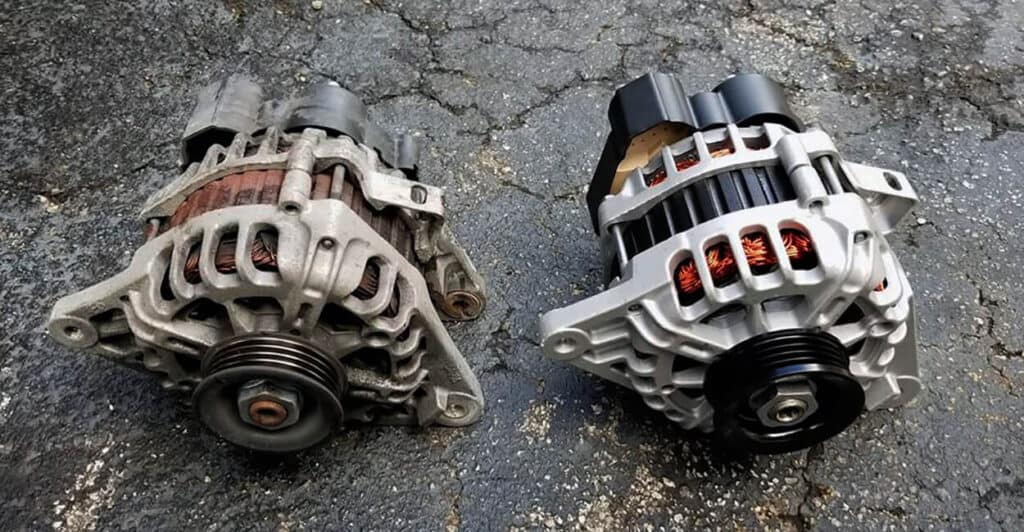
The alternator charges the battery and powers the vehicle’s electrical system. If the alternator fails, your battery may not stay charged, preventing the Jeep from starting. A bad alternator can lead to battery drain and starting issues.
Fuel System Malfunctions
Fuel system problems, such as a failing fuel pump or clogged filter, can prevent your Jeep from starting. If the fuel pump doesn’t deliver fuel properly or the filter is blocked, the engine may not get enough fuel to start.
Security System Interference
Sometimes, your Jeep’s security system or anti-theft features can prevent the vehicle from starting. If the system detects a problem or malfunction, it may stop the engine from beginning to protect against theft.
Resetting Your Jeep’s Security System
To reset your Jeep’s security system, follow the steps in your owner’s manual. Typically, this involves turning the ignition key to the “on” position for a few minutes or using the key fob to reset the system. This can clear any security-related issues.
Wiring and Electrical Issues
- Corroded battery connections prevent proper power flow.
- Loose or damaged wires that disrupt the electrical connection.
- Blown fuses cause electrical failure and avoid starting.
- Flickering or dim dashboard lights indicate electrical problems.
- Intermittent power loss affecting the starter motor or ignition system.
- Burnt or frayed wires can cause short circuits or prevent the engine from starting.
Step-by-Step Process
1. Troubleshooting Process
- Check the battery – Ensure it’s fully charged and connections are clean and tight.
- Inspect the starter – Listen for clicking sounds and check for any physical damage.
- Examine the ignition switch – Test if it turns smoothly and the engine cranks.
- Verify fuel delivery – Check if the fuel pump is working and the fuel filter is clean.
- Inspect wiring – Look for corroded or damaged wires that might interrupt power flow.
- Test alternator – Ensure the alternator is charging the battery properly.
- Check the security system – Make sure the anti-theft system doesn’t prevent starting.
2. Tools Needed for Diagnostics
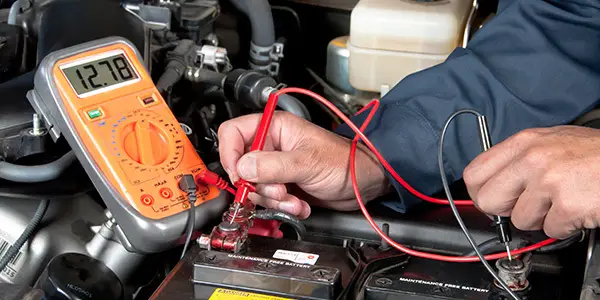
- Multimeter to test battery voltage and starter circuit.
- A socket set for removing parts like the starter or battery connections.
- A test light is used to check the power of key components.
- Wrench set for loosening and tightening bolts.
- Fuel pressure gauge to check fuel delivery.
- Battery terminal cleaner for cleaning connections.
3. Visual Inspection Checklist
- Battery – Check for corrosion, loose connections, and signs of wear.
- Starter motor – Look for physical damage or signs of wear.
- Ignition switch – Ensure the key turns smoothly and all contacts are clean.
- Fuel system – Inspect fuel lines, filter, and pump for damage or leaks.
- Wiring – Check for frayed, damaged, or corroded wires.
- Alternator – Look for wear or damage to the alternator belt and connections.
4. Testing the Starter Circuit
- Use a multimeter to check for voltage at the starter motor.
- If there’s no voltage, check the ignition switch and starter relay.
- Test the starter solenoid for proper function.
- Inspect the wiring for issues or continuity if the starter is not receiving power.
5. Verifying Fuel Delivery
- Listen for the fuel pump when turning the key to the “on” position.
- Use a fuel pressure gauge to measure fuel pressure at the engine.
- Check the fuel filter for clogs or debris that might restrict fuel flow.
- Inspect the fuel lines for leaks or blockages.
Also Read: 2021 Jeep Grand Cherokee L Battery – How To Replace It 2024!
When to Seek Professional Help
1. Recognizing Advanced Issues
Advanced issues may involve the fuel system, ignition, or electrical wiring. If you notice persistent starting problems despite basic fixes, it’s time to consult a professional.
2. Finding a Reliable Mechanic
Look for a mechanic with good reviews and experience with Jeep vehicles. A reliable mechanic will offer honest advice, thorough inspections, and quality repairs for your Jeep.
Preventing Starting Issues in the Future
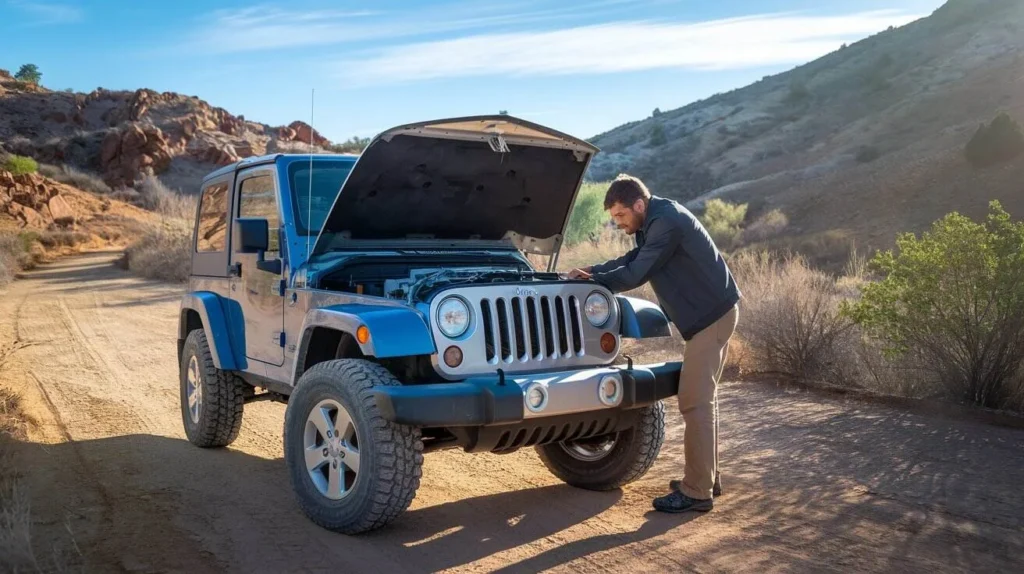
1. Regular Maintenance Practices
Perform routine maintenance such as changing the oil, cleaning the battery terminals, and replacing air filters. Regular starter, alternator, and fuel system checks will help keep your Jeep reliable.
2. Tips for Keeping Your Jeep Reliable
Keep your Jeep’s battery fully charged, clean the terminals often, and replace worn-out parts quickly. Regular maintenance and timely repairs ensure your Jeep stays dependable on the road.
Jeep won t start, but the battery is good
If your Jeep won’t start but the battery is good, the issue could be with the starter motor, ignition switch, or a faulty relay. Check the wiring connections, and consider testing the starter or ignition system.
My jeep won’t start but the radio and lights work
If the radio and lights work but the Jeep won’t start, it may be a problem with the starter motor, ignition switch, or a bad connection. Ensure all connections are clean, and check the starters and fuses.
2013 jeep won t start, but the battery is good
The issue for a 2013 Jeep that won’t start despite a good battery could be the starter, ignition switch, or fuel system. Check the starter motor, fuel pump, and fuses to rule out these parts.
The 2016 jeep won t start, but the battery is good
In a 2016 Jeep with a good battery but no start, the problem could lie in the starter motor, ignition system, or alternator. Inspect these parts and check the wiring for any damage.
Jeep not starting clicking noise
A clicking noise when your Jeep won’t start usually means a faulty starter motor or a weak battery. Even with a good battery, check the starter motor, solenoid, and connections to ensure they function properly.
Jeep cherokee won’t start but has power
Check the starter motor, ignition switch, or fuel system. Power but no start could indicate a malfunction in these parts.
Jeep wrangler won’t start no click
No clicking sound could mean a bad ignition switch, faulty starter, or loose connections. Inspect the battery, fuses, and starter.
Jeep won’t start brake locked
If the brake is locked, it could be a brake switch or a security system issue. Check the brake pedal and anti-theft system.
Read More: 2021 Jeep Cherokee Battery Issues – Solution Tips Of 2024!
FAQs
1. Why is my Jeep not starting but has power?
It could be a faulty starter, ignition switch, or fuel system issue.
2. What does it mean when your car won’t start but the battery works?
It suggests possible issues with the starter motor, ignition system, or fuel delivery.
3. Why won’t my Jeep start, but the radio and lights work?
Check the starter, ignition switch, or relays, as they might malfunction.
4. How do I know if my Jeep starter is bad?
Signs include clicking noises, slow cranking, or no engine turnover when turning the key.
5. Why does my car have full power but won’t start?
Possible causes include a bad starter, ignition, or fuel delivery problems. Check thoroughly.
6. Why is my Jeep not starting and clicking?
A clicking noise usually means the starter is malfunctioning or the battery has insufficient charge. Check the battery and starter.
7. Can you jump a Jeep with a bad starter?
Jump-starting won’t fix a bad starter. It may temporarily provide power, but the starter needs repair or replacement.
8. How do I know if it’s my starter or ignition switch?
The starter might be bad if the Jeep clicks but doesn’t turn over. If there is no power, the ignition switch could be faulty.
9. How much does it cost to replace a starter in a Jeep?
Replacing a Jeep starter typically costs $300 to $500, including parts and labor.
10. Why does my car have power and click but wont start?
A clicking sound with power usually indicates a bad starter or a weak battery. Check the connections and test the starter.
Conclusion
In conclusion, if your Jeep doesn’t start despite having a good battery, it could be due to a faulty starter, ignition switch, or fuel system issues. Check the wiring, starter motor, and ignition components. Regular maintenance can help avoid future problems.

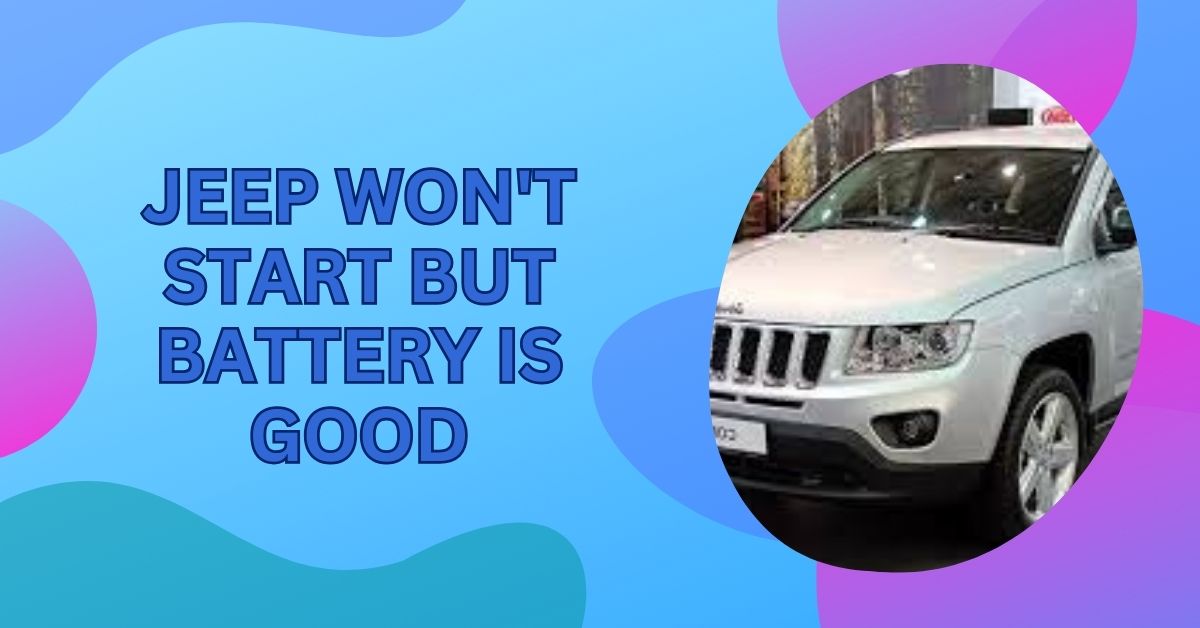




0 Comments